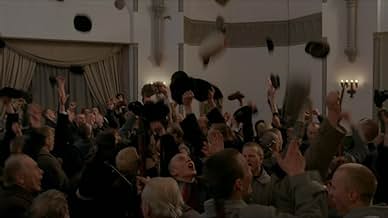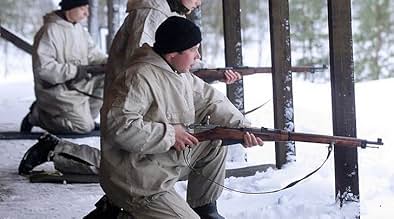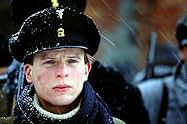Nimed marmortahvlil
- 2002
- 1h 35min
NOTE IMDb
7,0/10
2,4 k
MA NOTE
Ajouter une intrigue dans votre langueThis movie is about the Estonian War of Independence (1918-1920), specifically the students fighting on the nationalist side, but also shown the conflict between two ideologies (Estonian nat... Tout lireThis movie is about the Estonian War of Independence (1918-1920), specifically the students fighting on the nationalist side, but also shown the conflict between two ideologies (Estonian nationalism and communism).This movie is about the Estonian War of Independence (1918-1920), specifically the students fighting on the nationalist side, but also shown the conflict between two ideologies (Estonian nationalism and communism).
- Réalisation
- Scénario
- Casting principal
- Récompenses
- 1 nomination au total
Hele Kõrve
- Marta
- (as Hele Kõre)
Bert Raudsep
- Käämer
- (as Bert Raudsepp)
Avis à la une
A story of Estonian high school students who volunteer to defend their country from the Bolshevik invasion in 1918. The only reason to give this film 7 stars is the Estonian film industry context. For Estonia, this film is truly great. Not only it covers previously poorly presented (in the visual art) part of this country's history, it also is very well made camera work wise and the action scenes are done properly. But the director perhaps could have swapped some of the pathetic patriotism (obviously borrowed from the book the film is based on) for real-life attitude. I'll never believe that 17-year-old boys will be that desperately willing to sacrifice their lives and virtually act as if they long for the Red Army bullets. Natural human fear of death is what makes any war scene so much more realistic.
I was anxious in seeing this movie, because this is biggest budgeted estonian film and there was a great fuzz about it. Well, the movie was above average.
The acting was good, considering that most of the actors were very young boys, who had just graduated acting school. The estonian commander didnt seem belivible to me, he just didnt look like a leader.
The biggest let down were the war scenes, where the russian soldiers couldnt hit any of the standing estonians and the machine gun fire didnt mowe down enough russians. The "love" scenes were a bit long, considering that the movie was quite short. I havent read the book that this movie was based on, there shouldnt be much differences in the story.
I will give this movie 7/10 points, it is the 2nd best Estonian movie IMO, after "Viimne reliikvia".
The acting was good, considering that most of the actors were very young boys, who had just graduated acting school. The estonian commander didnt seem belivible to me, he just didnt look like a leader.
The biggest let down were the war scenes, where the russian soldiers couldnt hit any of the standing estonians and the machine gun fire didnt mowe down enough russians. The "love" scenes were a bit long, considering that the movie was quite short. I havent read the book that this movie was based on, there shouldnt be much differences in the story.
I will give this movie 7/10 points, it is the 2nd best Estonian movie IMO, after "Viimne reliikvia".
This movie is totally for people who like foreign movies. And it really is the best movie, shot in Estonia (though Tarkovski's S.T.A.L.K.E.R. was also shot in Estonia) and by Estonians. I only disliked the ending, when the main character turned into a Rambo-like character. That was a shitty idea. A bigger budget would have given the movie something more, though it had a huge budget for an Estonian movie. Computer graphics was so good, that know one knows, there were any, actually they used CGI to hide things in city-scene, they copied some soldiers and they made other changes as well...
And those who don't know about the war in the movies, should know, that there were similar wars in almost every Eastern-Europe countries between 1917-1920, cause Russia was weakened and unstable because of the World War I, and freedom fighters had good chances due that.
7.5/10
And those who don't know about the war in the movies, should know, that there were similar wars in almost every Eastern-Europe countries between 1917-1920, cause Russia was weakened and unstable because of the World War I, and freedom fighters had good chances due that.
7.5/10
I was really looking forward to see this movie. When finally I saw it on TV in Latvia I thought that Estonians have really done it well. Of course it isn't masterpiece but history also is not as beautiful as we would want to see it. 5 countries around the Baltic sea gained their independence in those years (Poland, Lithuania, Latvia, Estonia, Finland)and each deserves to tell their own story to the world. For me it was a beautiful story about young people and the decisions they must make in crucial situations. Unfortunately, they couldn't make the same decisions when they were older and experienced (or maybe they couldn't because of it). For me it was interesting to see the portrait of Latvians in the war against Estonia. As one Finnish guy said he didn't understand why Latvians fought against Estonia. It was because those Latvians weren't supporters of independent Latvia. Latvia's real army wasn't fighting against Estonia. As it is for Finland we Latvians also must say thanks that independent Estonia later helped to fight against both the Soviets and the remains of German army.That in territory of Estonia was formed part of the independent Latvian army. These Latvians showed in this movie were communists who fought to build communism in Latvia. At that time there were 3 different governments in Latvia (1st independent Latvian, 2nd communist government, 3rd German-orientated government) so it is complicated not only for foreigners to understand but for Latvians who don't know history so well too.
The record-making, dazzling and thrilling Estonian blockbuster `Names in Marble' has brought nearly 150,000 people all over the country out of their comfortable homes to see something that takes your breath away.
The story evolves around a group of young schoolboys who decide to alter the course of history once and for all - to fight against the Soviet army and for the freedom of the new Republic of Estonia.
`Names in Marble' opens a doorway to a new dimension of Estonian cinema. Directed by Elmo Nüganen who is famous for his interpretation of many classical plays in several theatres in Estonia, the movie has a unique sense of closeness and significance that is not common for other Estonian movies. Nüganen adds another flavour to the picture by hiring the well-known Russian cameraman Sergei Astakhov to record the key scenes and arrange the almost perfect cinematography of the movie.
Another astonishment that the moviegoers might experience is the great work of some young and promising Estonian actors. The sincerity and clarity of the leading role, played by Priit Võigemast represents the possibilities and potential of Estonian cinema in reaching an international level.
It is unfortunate that the best yet Estonian movie has absolutely has no chance of getting a nomination for the `Best foreign film' Academy award - it lacks a certain multi-cultural perspective.
In the end it brought tears to the eyes, it did matter and it made us sit in the theatre until all the credits were shown and lights came on, reminding us how important it is to be who we are.
The story evolves around a group of young schoolboys who decide to alter the course of history once and for all - to fight against the Soviet army and for the freedom of the new Republic of Estonia.
`Names in Marble' opens a doorway to a new dimension of Estonian cinema. Directed by Elmo Nüganen who is famous for his interpretation of many classical plays in several theatres in Estonia, the movie has a unique sense of closeness and significance that is not common for other Estonian movies. Nüganen adds another flavour to the picture by hiring the well-known Russian cameraman Sergei Astakhov to record the key scenes and arrange the almost perfect cinematography of the movie.
Another astonishment that the moviegoers might experience is the great work of some young and promising Estonian actors. The sincerity and clarity of the leading role, played by Priit Võigemast represents the possibilities and potential of Estonian cinema in reaching an international level.
It is unfortunate that the best yet Estonian movie has absolutely has no chance of getting a nomination for the `Best foreign film' Academy award - it lacks a certain multi-cultural perspective.
In the end it brought tears to the eyes, it did matter and it made us sit in the theatre until all the credits were shown and lights came on, reminding us how important it is to be who we are.
Le saviez-vous
- GaffesThere's a surfaced road in one scene, but in Tartu in 1918 there were no tarmac roads.
- ConnexionsFeatured in Welcome to Estonia (2002)
Meilleurs choix
Connectez-vous pour évaluer et suivre la liste de favoris afin de recevoir des recommandations personnalisées
Détails
- Date de sortie
- Pays d’origine
- Sites officiels
- Langues
- Aussi connu sous le nom de
- Names Engraved in Marble
- Lieux de tournage
- Sociétés de production
- Voir plus de crédits d'entreprise sur IMDbPro
Box-office
- Budget
- 24 000 000 EEK (estimé)
- Montant brut mondial
- 83 112 $US
- Durée
- 1h 35min(95 min)
- Couleur
- Mixage
- Rapport de forme
- 1.85 : 1
Contribuer à cette page
Suggérer une modification ou ajouter du contenu manquant





















